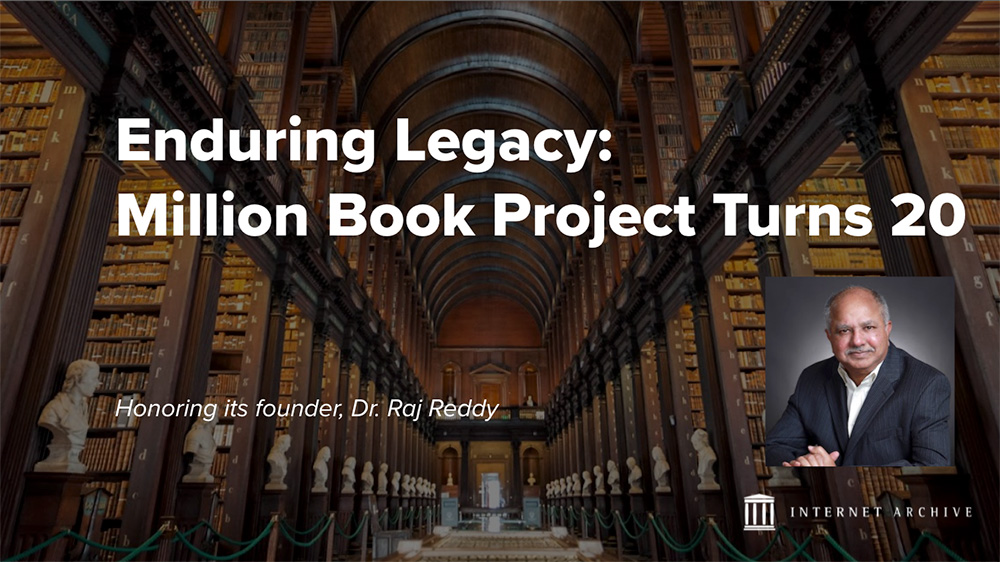
Years ago, many people rejected the idea of reading a book on a screen. Fortunately, others had a vision for the potential of digitizing the world’s knowledge.
One of those pioneers was Carnegie Mellon Professor Raj Reddy. The Internet Archive recently hosted a virtual event to honor him and celebrate the 20th anniversary of his Million Book Project that included Reddy, Vint Cerf of Google, Moriel Schottlender of the Wikimedia Foundation, Brewster Kahle of the Internet Archive, Mike Furlough of HaithiTrust, and Liz Ridolfo of the University of Toronto.
Since Reddy’s dream of providing universal access to all human knowledge—instantly to anyone, anywhere in the world—others have embraced the mission. Advocates of mass digitization discussed the tremendous impact that open access to creative works online has had on society, the challenges ahead, and potential, if more books are unleashed.
“There are tens of millions of digitized books available on the internet now. Many of these are born digital. Many more are being converted from print copies,” said Mike Furlough, executive director at HathiTrust, which has a collection of 17.5 million digital books. “This is really a human accomplishment that represents decades, if not centuries, of intellectual labor, physical labor to steward and preserve these items.”
Reddy said he knew his vision two decades ago was just the beginning and there is a huge amount of room to improve the utility of digital works. “It’s time for us to put our heads together to find a way to create digital libraries and archives that are far more useful than what we have today,” he said.
Many agreed more must be done to expand efforts, build a sustainable infrastructure and raise awareness of the shifting role of libraries to provide digital materials.
“I think we should ask more questions: What aren’t we digitizing? What are the economic or political forces that are constraining our choices and what corrective measures can we take?”
Mike Furlough, executive director, HathiTrust
Internet Archive Founder Brewster Kahle said Reddy was right that bringing our full history online for the next generation is important, but it’s not been easy technically or institutionally.
“If we’ve ever wondered why you’d want digital books, the year 2020 told us why. The global pandemic hit and shut down school libraries, public libraries, and college libraries,” Kahle said. “We got calls from professors, teachers and homeschoolers, desperate to find some way in their Zoom classrooms to bring books to kids.”
The Internet Archive responded, explaining how libraries could extend access digitally to books that were in their physical collections. This helped make a big difference on the ground, and Kahle says policies are changing so libraries are confident in serving their digital learners. For instance, as libraries spend $12 billion a year on materials, Kahle said they should be able to purchase (not lease) e-books to fulfill their mission of service to users.
There was also a push among panelists for digitization to be more inclusive of works from all kinds of authors, recognizing what is being scanned is what’s already been obtained by libraries. “I think we should ask more questions: What aren’t we digitizing? What are the economic or political forces that are constraining our choices and what corrective measures can we take?” Furlough said.
The future interaction with knowledge involves the digitization of books and expanding the diversity of voices is critical, said Moriel Schottlender, principal system architect with the Wikimedia Foundation.
“Making resources available to anyone online is key and this is really what we’re striving for,” said Schottlender, noting Wikipedia’s mission is to be a beacon of factual information that is verifiable, neutral and transparent. “Our goal is that everyone in the world should be able to contribute to the sum of all knowledge. But not everyone has equal access to knowledge, to books, to journals, to libraries, to educational materials…We use digitization to increase equity.”
“Our goal is that everyone in the world should be able to contribute to the sum of all knowledge. But not everyone has equal access to knowledge…We use digitization to increase equity.”
Moriel Schottlender, principal system architect, Wikimedia Foundation
There is growing demand for all kinds of digital information, said Liz Ridolfo, special collections projects librarian at University of Toronto Libraries.. Donors want items digitized for a variety of reasons including to protect rare items, to reach a broader audience, and to free up physical space for other materials. Especially during the pandemic, Ridolfo said, it has been useful to have a curated collection of online teaching and reference materials.
Vint Cerf, vice president and internet evangelist at Google, said people are increasingly going online to get answers to questions—often turning to YouTube to view how-to videos. That demand for “just-in-time learning” is not a substitute for long-form content, he said, but it’s an interesting phenomenon that may draw people to the internet to learn more.
Looking ahead, Reddy said there is a need for big change to address the broken copyright law. His aspiration is that by 2031, there will be a frictionless, streamlined copyright regime, in which authors register for no fee, but can extend the copyright of a work indefinitely if they want by paying a prescribed fee. For users, he proposes access to copyright material for fair use in less than five minutes. They could pay a required fee, as prescribed by the data for a single copy use. If the copyright is not registered with the national digital library, then fines for copyright violations of unregistered copyright material should be nominal.
“Let’s take Raj’s vision here and make it come true,” Kahle said. “Who should argue against the streamline system where fair uses are easy. Where compensation is understood, where there’s registration and the actual copyrighted materials are in repositories that are long-term protected. Let’s just do this.”
Very much impressive .. i haven’t more words.
thanks
great post